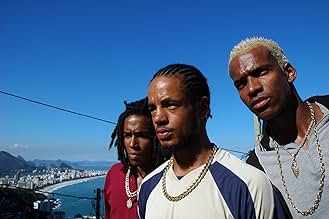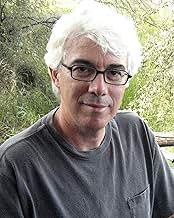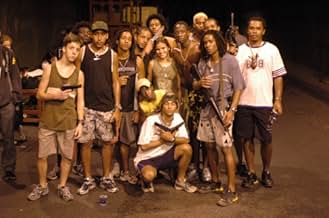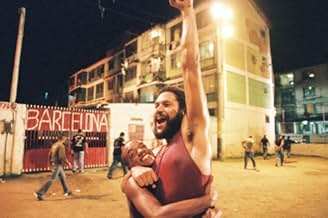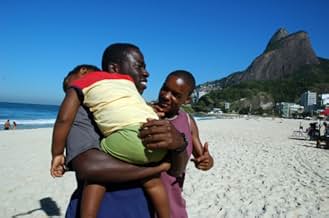IMDb-BEWERTUNG
7,2/10
16.664
IHRE BEWERTUNG
Füge eine Handlung in deiner Sprache hinzuBest buddies Acerola and Laranjinha, about to turn 18, discover things about their missing fathers' pasts which will shatter their solid friendship, in the middle of a war between rival drug... Alles lesenBest buddies Acerola and Laranjinha, about to turn 18, discover things about their missing fathers' pasts which will shatter their solid friendship, in the middle of a war between rival drug gangs from Rio's favelas.Best buddies Acerola and Laranjinha, about to turn 18, discover things about their missing fathers' pasts which will shatter their solid friendship, in the middle of a war between rival drug gangs from Rio's favelas.
- Auszeichnungen
- 14 Nominierungen insgesamt
Naima Silva
- Camila
- (as Naíma Silva)
Eduardo 'BR' Piranha
- Nefasto
- (as Eduardo BR)
Empfohlene Bewertungen
It has been estimated that 19 percent of the population of Rio de Janeiro live in favelas, shanties crowded onto hillsides not far from luxurious apartments and world famous beach resorts. Notorious breeding grounds for poverty, drug addiction, and gang warfare, the favelas with their picturesque street names such as Dead End Hill, have been the subject of critically acclaimed films such as Hector Babenco's Pixote and Fernando Meirelles' City of God. Based on a long running television series that ran on Brazilian TV Globo for four years and was watched by 35 million viewers, Paolo Morelli's City of Men is a follow-up to the more flashy Meirelles film. While it lacks the earlier work's kinetic energy, it is more emotionally satisfying and has characters that we care about.
The film focuses on two friends, both turning 18 and without fathers. The two boys, Acerola and Laranjinha, (given Americanized names Ace and Wallace in the subtitles) have unresolved father issues. Wallace is trying to locate the father he never knew and Ace wants to find out how and why his father was killed. Actors Douglas Silva and Darlan Cunha both appeared in the TV series and footage from the TV series is used for flashbacks in the film, shown in a faded color palette. Both are natural actors who do a remarkable job. Ace, though only 18, lives with his wife Cris (Camilla Monteiro) in one of the shanties and is the father of a young boy named Clayton (Vinicius Oliveira). Ace is immature enough to leave Clayton alone on the beach in an early sequence but must grow up quickly and assume complete responsibility for Clayton's care when Cris takes a job in Sao Paolo.
Shot by cinematographer Adriano Goldman who provides sweeping panoramas of the hills, mountains, and beaches, the film begins on the top of Dead End Hill on a day so brutally hot I could feel the sweat gathering on my forehead. Gang members with handguns and automatic weapons led by Midnight (Jonathan Haagensen) decide to head down to the ocean, establishing a perimeter of guards who tell the cops that they are on route. The emotional center of the film is the relationship between Wallace and his newly discovered father Heraldo played with strength and dignity by Rodrigo Dos Santos. Heraldo is out on parole after having served fifteen years of a twenty year sentence for robbery and murder. The circumstances of the murder that he committed becomes a central issue in the relationship between Ace and Wallace and secrets about both of their fathers' pasts threaten their friendship and lead to their involvement on different sides of a new eruption of gang violence.
Somewhat melodramatic but never manipulative or false, City of Men transcends the familiar format of hand-held camera hyperactivity and gangster clichés to become a tender and deeply affecting story about abandoned children and how the cycle is repeated from one generation to the next. While the film explodes into warfare between rival gangs led by Midnight and Fasto (Eduardo BR), it is devoid of typical heavily stylized and frenetic violence. Ace and Wallace are characters we get to know and identify with. We want them to defy the odds and survive until adulthood though the tragic history of life in the Rio slums is never far from our mind.
The film focuses on two friends, both turning 18 and without fathers. The two boys, Acerola and Laranjinha, (given Americanized names Ace and Wallace in the subtitles) have unresolved father issues. Wallace is trying to locate the father he never knew and Ace wants to find out how and why his father was killed. Actors Douglas Silva and Darlan Cunha both appeared in the TV series and footage from the TV series is used for flashbacks in the film, shown in a faded color palette. Both are natural actors who do a remarkable job. Ace, though only 18, lives with his wife Cris (Camilla Monteiro) in one of the shanties and is the father of a young boy named Clayton (Vinicius Oliveira). Ace is immature enough to leave Clayton alone on the beach in an early sequence but must grow up quickly and assume complete responsibility for Clayton's care when Cris takes a job in Sao Paolo.
Shot by cinematographer Adriano Goldman who provides sweeping panoramas of the hills, mountains, and beaches, the film begins on the top of Dead End Hill on a day so brutally hot I could feel the sweat gathering on my forehead. Gang members with handguns and automatic weapons led by Midnight (Jonathan Haagensen) decide to head down to the ocean, establishing a perimeter of guards who tell the cops that they are on route. The emotional center of the film is the relationship between Wallace and his newly discovered father Heraldo played with strength and dignity by Rodrigo Dos Santos. Heraldo is out on parole after having served fifteen years of a twenty year sentence for robbery and murder. The circumstances of the murder that he committed becomes a central issue in the relationship between Ace and Wallace and secrets about both of their fathers' pasts threaten their friendship and lead to their involvement on different sides of a new eruption of gang violence.
Somewhat melodramatic but never manipulative or false, City of Men transcends the familiar format of hand-held camera hyperactivity and gangster clichés to become a tender and deeply affecting story about abandoned children and how the cycle is repeated from one generation to the next. While the film explodes into warfare between rival gangs led by Midnight and Fasto (Eduardo BR), it is devoid of typical heavily stylized and frenetic violence. Ace and Wallace are characters we get to know and identify with. We want them to defy the odds and survive until adulthood though the tragic history of life in the Rio slums is never far from our mind.
"Poverty, to be picturesque, should be rural. Suburban misery is as hideous as it is pitiable." Anthony Trollope
Whew! I'm out of breath following youth gangs in the favela of Rio as they fight for a city hill as if they were in WWII's Pork Chop battle. Machine guns rule; women do not (contrary to the stereotype of matriarchal Latin society). It may not be City of God, the frenetic precursor using two of the same actors, but it has the Battle of Algiers' claustrophobia, which had a better-appointed Kasbah yet the same feeling of people darting around corners to avoid ever present Death.
The two central characters, teenage boys trying to keep their friendship and families in tact while around them chaos rules, veer between themselves and annihilation as they fight off the temptation to carry weapons like their friends yet can't find a way to survive without guns. There is more, however, than just gang warfare because sub-textually director/writer Paulo Morelli identifies a root cause of the dislocationsabsentee fathers. (Heck, even the current Spiderwick uses this powerful ingredient.) Much of the film is dedicated to one of the boys finding his father and the other coming to terms with the murder of his. While the former is adequately explored, the latter could have used much more explanation for the boy's suddenly joining the gang's war. Could it have been the murder of his father? I can't tell you.
The requisite hillside shots of the Rio harbor help the figurative contrast between the rich Brazilian scenery and the squalor of the barrio. Both conditions, of course, help to emphasize the globally accurate distance between the have's and the have not's, a condition the present economic global downturn is exacerbating. City of Men is a city of all men, racing through the labyrinth of life trying to survive, and losing.
City of God is a movie that contradicts its name; City of Men is spot onGod help us.
Whew! I'm out of breath following youth gangs in the favela of Rio as they fight for a city hill as if they were in WWII's Pork Chop battle. Machine guns rule; women do not (contrary to the stereotype of matriarchal Latin society). It may not be City of God, the frenetic precursor using two of the same actors, but it has the Battle of Algiers' claustrophobia, which had a better-appointed Kasbah yet the same feeling of people darting around corners to avoid ever present Death.
The two central characters, teenage boys trying to keep their friendship and families in tact while around them chaos rules, veer between themselves and annihilation as they fight off the temptation to carry weapons like their friends yet can't find a way to survive without guns. There is more, however, than just gang warfare because sub-textually director/writer Paulo Morelli identifies a root cause of the dislocationsabsentee fathers. (Heck, even the current Spiderwick uses this powerful ingredient.) Much of the film is dedicated to one of the boys finding his father and the other coming to terms with the murder of his. While the former is adequately explored, the latter could have used much more explanation for the boy's suddenly joining the gang's war. Could it have been the murder of his father? I can't tell you.
The requisite hillside shots of the Rio harbor help the figurative contrast between the rich Brazilian scenery and the squalor of the barrio. Both conditions, of course, help to emphasize the globally accurate distance between the have's and the have not's, a condition the present economic global downturn is exacerbating. City of Men is a city of all men, racing through the labyrinth of life trying to survive, and losing.
City of God is a movie that contradicts its name; City of Men is spot onGod help us.
Following the cult Brazilian TV series "City of Men" (2002-2005), Acerola (Douglas Silva) and Laranjinha (Darlan Cunha), two orphaned, teenage street kids living in Morro da Sinuca (one of Rio's 800+ favelas), are now about to turn eighteen and face the issues of adulthood. Fatherhood -- in a social milieu where most kids grow up fatherless -- is the key theme here: Acerola is now a teen dad who has to take care of his baby boy when his teen wife moves to São Paulo to work as a babysitter; and Laranjinha is on the search of the identity of his unknown father, only to discover he's alive and is an ex-convict on parole. On the background, the violent, destitute, lawless, drug-gang controlled life in Rio's favelas.
A sort of mix of Fernando Meirelles' (co-producer here) "City of God" in visual style and "Oliver Twist" in spirit, one of the major problems of "City of Men" is its contrived plot solutions: we have to deal with Acerola's impossibly fast finding of Laranjinha's father whereabouts. And Acerola's grandmother ending up homeless and abandoned by her family (in the film's phoniest solution). And trafficker Nefasto suddenly changing sides in the gang war; and Acerola's one-chance-in-a-million spotting trafficker Fiel still alive, and the phony solution linking Acerola's and Laranjinha's fathers in the past, etc.
Director Paulo Morelli -- who made the practically unseen "Preço da Paz" and the insipid "Viva Voz", and directed some episodes of the "City of Men" TV series -- comes from the publicity world, and it certainly shows. His images are (too) soigné: the black bodies have a golden shine, with pearly sweat drops and blazingly white teeth. He adopts cinéma-vérité style (in the camera-work, dialog, performances), now de rigueur in films dealing with "stark realities". Oscar-nominated editor Daniel Rezende ("City of God", "Motorcycle Diaries") tries to keep things moving fast so we don't have time to think about plot holes and contrivances. Antonio Pinto's music is beautiful but inexplicably old-fashioned for a movie about teenagers. On a positive note, the sound design and effects are superb.
The cast -- most of them from the TV series -- is asked to do more of the same. Douglas Silva (Acerola) relies on his intuitive acting and his big, expressive fish face. Jonathan Haagensen (as drug lord Madrugadão) again acts with his pout and bare torso in his usual laid back bad-boy style, looking suitably stoned. Babu Santana does his usual scenery-chewing in a bit as a trafficker. Camila Monteiro, Luciano Vidigal (a sensitive actor with an impossible part) and others repeat their TV roles. Eduardo BR as Nefasto suggests a blooming talent; Rodrigo dos Santos as Laranjinha's father has a great movie face, and first-timers Pedro Henrique (Caju) and Naíma Silva (Camila) are sensitively directed. The best is Darlan Cunha as Laranjinha: no-nonsense, nonplussed, witty and resourceful, his deadpan acting is the essence of the "carioca cool".
But there's something bothersome about "Cidade dos Homens": it's hard to concentrate on Acerola's sex troubles or Laranjinha's unlikely instant attachment to his shady father (are Rio's street kids really this naive?) when characters like Caju (the dim-witted, glamor-seeking teenager who joins the drug gang) or those really original characters -- the teenage girls that have "upgraded" from "gangsta molls" to becoming gangstas themselves -- screamed for attention and development. The fact is it's weird to take "City of Men" for its face value, i.e. a buddy-buddy movie with the favela drug war on the background, though we all know ordinary life somehow always goes on even in the most violent, crude realities.
By focusing on the personal problems of Acerola and Laranjinha, director Morelli and writer Elena Soárez ("House of Sand", "Eu Tu Eles", lending a sensitive touch to what could have been a stolid buddy movie) choose to concentrate on plot and characters, using a lot of big close-ups of the kids' faces so we won't be distracted by the hellish favela background -- and yet the "background" jumps right on our laps. Poverty, segregation, racism, drugs, guns and violence, the absence of schools, hospitals, formal employment or government assistance, the dire conditions of life in the favelas that affect over one million people in Rio are, in fact, the cause of most of Acerola and Laranjinha's "personal" problems. Maybe one day we'll all be desensitized enough to take that sort of background as routine scenery, but not right yet.
"City of Men" has a major asset, anyhow: the final scene is lyrical, ingenious and filled with humor -- it's a great finale for the successful series that dared put on Brazilian TV favela teenagers as protagonists, teenagers who usually just show up in movies and TV (and, many times, and tragically, in real life) as traffickers, junkies, thieves or corpses.
A sort of mix of Fernando Meirelles' (co-producer here) "City of God" in visual style and "Oliver Twist" in spirit, one of the major problems of "City of Men" is its contrived plot solutions: we have to deal with Acerola's impossibly fast finding of Laranjinha's father whereabouts. And Acerola's grandmother ending up homeless and abandoned by her family (in the film's phoniest solution). And trafficker Nefasto suddenly changing sides in the gang war; and Acerola's one-chance-in-a-million spotting trafficker Fiel still alive, and the phony solution linking Acerola's and Laranjinha's fathers in the past, etc.
Director Paulo Morelli -- who made the practically unseen "Preço da Paz" and the insipid "Viva Voz", and directed some episodes of the "City of Men" TV series -- comes from the publicity world, and it certainly shows. His images are (too) soigné: the black bodies have a golden shine, with pearly sweat drops and blazingly white teeth. He adopts cinéma-vérité style (in the camera-work, dialog, performances), now de rigueur in films dealing with "stark realities". Oscar-nominated editor Daniel Rezende ("City of God", "Motorcycle Diaries") tries to keep things moving fast so we don't have time to think about plot holes and contrivances. Antonio Pinto's music is beautiful but inexplicably old-fashioned for a movie about teenagers. On a positive note, the sound design and effects are superb.
The cast -- most of them from the TV series -- is asked to do more of the same. Douglas Silva (Acerola) relies on his intuitive acting and his big, expressive fish face. Jonathan Haagensen (as drug lord Madrugadão) again acts with his pout and bare torso in his usual laid back bad-boy style, looking suitably stoned. Babu Santana does his usual scenery-chewing in a bit as a trafficker. Camila Monteiro, Luciano Vidigal (a sensitive actor with an impossible part) and others repeat their TV roles. Eduardo BR as Nefasto suggests a blooming talent; Rodrigo dos Santos as Laranjinha's father has a great movie face, and first-timers Pedro Henrique (Caju) and Naíma Silva (Camila) are sensitively directed. The best is Darlan Cunha as Laranjinha: no-nonsense, nonplussed, witty and resourceful, his deadpan acting is the essence of the "carioca cool".
But there's something bothersome about "Cidade dos Homens": it's hard to concentrate on Acerola's sex troubles or Laranjinha's unlikely instant attachment to his shady father (are Rio's street kids really this naive?) when characters like Caju (the dim-witted, glamor-seeking teenager who joins the drug gang) or those really original characters -- the teenage girls that have "upgraded" from "gangsta molls" to becoming gangstas themselves -- screamed for attention and development. The fact is it's weird to take "City of Men" for its face value, i.e. a buddy-buddy movie with the favela drug war on the background, though we all know ordinary life somehow always goes on even in the most violent, crude realities.
By focusing on the personal problems of Acerola and Laranjinha, director Morelli and writer Elena Soárez ("House of Sand", "Eu Tu Eles", lending a sensitive touch to what could have been a stolid buddy movie) choose to concentrate on plot and characters, using a lot of big close-ups of the kids' faces so we won't be distracted by the hellish favela background -- and yet the "background" jumps right on our laps. Poverty, segregation, racism, drugs, guns and violence, the absence of schools, hospitals, formal employment or government assistance, the dire conditions of life in the favelas that affect over one million people in Rio are, in fact, the cause of most of Acerola and Laranjinha's "personal" problems. Maybe one day we'll all be desensitized enough to take that sort of background as routine scenery, but not right yet.
"City of Men" has a major asset, anyhow: the final scene is lyrical, ingenious and filled with humor -- it's a great finale for the successful series that dared put on Brazilian TV favela teenagers as protagonists, teenagers who usually just show up in movies and TV (and, many times, and tragically, in real life) as traffickers, junkies, thieves or corpses.
"City of Men" is a companion piece to Fernando Meirelles' 2002 film "City of God," but it's a much different animal from the earlier film. Both are set in the slums of Rio de Janeiro, and both are about young men fashioning lives for themselves out of the only resources available to them. But whereas "City of God" was kinetic, angry and immediate, "City of Men" is more reflective and conventional, and it comes to a much more hopeful conclusion than the earlier film.
"City of Men" is by far the weaker of the two. The carefully crafted screenplay was full of the heavy themes and plot twists of a Shakesperean tragedy, but I found myself missing the unscripted, documentary-like feel of Meirelles' film. "City of Men" is about the absence of fathers, and about two friends who find themselves fighting on opposite sides because of deeds committed by their own dads -- sons literally inheriting the sins of their fathers. But the script is too often heavy handed, and the director, Paulo Morelli, chooses to communicate too much about the lives of these people through blunt exposition. We don't learn about them from what the actors playing them do or how they act, but rather through the lines they read, and we're almost always aware that they're reading lines.
Nevertheless, the acting is strong enough that I found myself caring for the two leads and fairly engrossed in how their stories turned out. Morelli isn't as accomplished a director as Meirelles, but the film is still well directed on its own more modest terms. If I didn't already have "City of God" to compare it to, I might have liked it even more.
Grade: B+
"City of Men" is by far the weaker of the two. The carefully crafted screenplay was full of the heavy themes and plot twists of a Shakesperean tragedy, but I found myself missing the unscripted, documentary-like feel of Meirelles' film. "City of Men" is about the absence of fathers, and about two friends who find themselves fighting on opposite sides because of deeds committed by their own dads -- sons literally inheriting the sins of their fathers. But the script is too often heavy handed, and the director, Paulo Morelli, chooses to communicate too much about the lives of these people through blunt exposition. We don't learn about them from what the actors playing them do or how they act, but rather through the lines they read, and we're almost always aware that they're reading lines.
Nevertheless, the acting is strong enough that I found myself caring for the two leads and fairly engrossed in how their stories turned out. Morelli isn't as accomplished a director as Meirelles, but the film is still well directed on its own more modest terms. If I didn't already have "City of God" to compare it to, I might have liked it even more.
Grade: B+
The film City of Men is a fantastic Brazilian film. It's directed by the same creator of City of God and the City of Men TV series. Now, personally, I recommend you watch the TV series before watching the movie due to many flashbacks throughout the film. The TV series also adds more depth to the characters that add to the overall enjoyment of the film. The film is still set in the favelas in Rio, but instead of focusing on the gangs as in City of God, it focuses on two 18 year old boys. The film is similar to City of God, but with a more light-hearted feel to it. The film also has similar cinematography. Overall, I prefer City of God to this film, but it is a worthy follow up to a fantastic film. 9 stars out of 10 in relation to City of God, but as a film in general, compared to the majority of films created this would deserve 10 stars.
Wusstest du schon
- WissenswertesJonathan Haagensen, Mumuzinho and Thiago Martins are some of the actors returning after City of God (2002), portraying new roles.
- PatzerWhen Camila is showing Wallace her hair and telling him where Ace is, a leg of the tripod holding the close up camera is visible on the right side in the wide shot of them.
- SoundtracksFlor E O Espinho
(uncredited)
Written by Nelson Cavaquinho, Guilherme de Brito and Alcides Caminha
Originally recorded by Paulinho Moska
Sung by Rodrigo dos Santos (Heraldo) in the shower
Top-Auswahl
Melde dich zum Bewerten an und greife auf die Watchlist für personalisierte Empfehlungen zu.
Details
- Erscheinungsdatum
- Herkunftsland
- Offizieller Standort
- Sprache
- Auch bekannt als
- Thành Phố Của Đàn Ông
- Drehorte
- Produktionsfirmen
- Weitere beteiligte Unternehmen bei IMDbPro anzeigen
Box Office
- Bruttoertrag in den USA und Kanada
- 325.131 $
- Eröffnungswochenende in den USA und in Kanada
- 130.579 $
- 2. März 2008
- Weltweiter Bruttoertrag
- 2.589.732 $
- Laufzeit1 Stunde 46 Minuten
- Farbe
- Sound-Mix
- Seitenverhältnis
- 1.85 : 1
Zu dieser Seite beitragen
Bearbeitung vorschlagen oder fehlenden Inhalt hinzufügen



![City Of Men [Cidade dos Homens]](https://m.media-amazon.com/images/M/MV5BMTIyMzgyNTUyMl5BMl5BanBnXkFtZTcwMzQ2NTc3MQ@@._V1_QL75_UX500_CR0)



